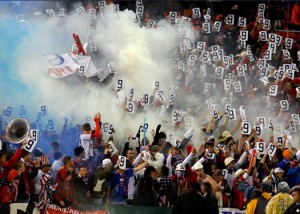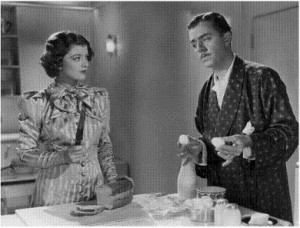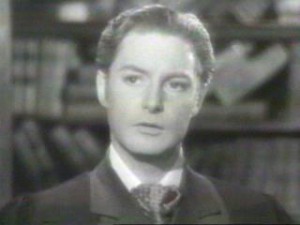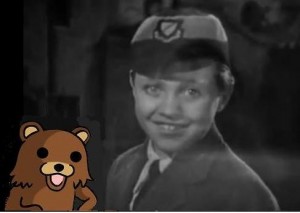Author’s note: Baconcat loves Gothic horror. He loves it for the atmosphere and the over the top lurid descriptions (oh, the Victorians, what wonderful hypocrite prudes they were!). However, if you don’t, you’ll probably want to skip this one.
Okay, you’ve been forewarned.
The 7:03
The blast of the train’s steam whistle ripped through the snowstorm and told Hannah she had guessed correctly. The sound emanated no more than 30 yards directly in front of her. The snowfall was so thick that when she fled her house only a few minutes ago she was forced to lay trust in only her feet to guide her to the train station. But her feet had run true, taking steps they had taken perhaps a thousand times before. Now, with only a few more steps she would be aboard the train and free of her dreadful pursuers. She wondered, if only for a moment, if she had truly been able to escape them. But if she had heard the whistle, they heard the whistle. Were she to make the train though, there would be safety in numbers.
How horrible the demons that forced her from her home had been! She imagined her pursuers’ blackened hands grasping at her, the greasy flesh falling off in terrible chunks, the sooty tallow leaving streaked stains on her dress. So nightmarish was this thought that she failed to see the step to the train platform and fell over it, almost spilling the little money purse clutched desperately in her hand. ’30 dollars.’ she whispered instinctively, as if by speaking it aloud she guaranteed its safety. 30 dollars was not much, but it would be enough for her to start a new life in Cleveland, maybe even Chicago. It was all her father had to his name. All of his savings, and yet only five minutes ago he had pressed it so willingly and firmly into her hand while he shuttled her out back door of the only home she had ever known.
“Just please go, child!” he said while pushing her reluctant body out into the cold night. He hadn’t even had time to tell her he loved her before the mob knocked down the front door. “Just go!” he cried as he ran to bar the kitchen door and buy his only child a few more precious seconds to flee. Just then, in the moment the front door had fallen, she’d seen the demons again leading the charge; Their burnt faces turned in a permanent toothy death smile, their white bones peeking through the torn and scarred skin as they forced their way through the house and slammed against the kitchen door. Hannah took one last look at her father mustering all the strength his 58 year old frame could manage to hold back the door, and then she turned and stumbled blindly into the raging storm.
 The whistle blew again as Hannah ran down the platform, racing for the train. As she boarded the train, she heard the desperate cries of her pursuers. They too had reached the platform, but devil be damned, they were too late! The train was already pulling out of the station. Even if they got aboard, they couldn’t hurt her here; not on a train, not with all the passengers for witnesses. In the town she may be a pariah, but here on a train full of strangers, she was an unknown damsel in distress. The demons could not touch her here.
The whistle blew again as Hannah ran down the platform, racing for the train. As she boarded the train, she heard the desperate cries of her pursuers. They too had reached the platform, but devil be damned, they were too late! The train was already pulling out of the station. Even if they got aboard, they couldn’t hurt her here; not on a train, not with all the passengers for witnesses. In the town she may be a pariah, but here on a train full of strangers, she was an unknown damsel in distress. The demons could not touch her here.
She found her way into the cabin and fell into the first available seat. Even though the seats were the uncomfortable wood and wrought iron benches of coach class, the cabin was warm, being heated by the coal fired oven, and she was so tired and relieved to be free of them that she drifted into a dream filled sleep.
Her sweet, departed mother came to mind first. She had been so beautiful! While she was alive all had been well in their small town. Her father had been happy then, for he considered himself the luckiest man alive. Having reached 40 with no mate, he had resigned himself to a life of solitude. Yet, when he met Hannah’s mother on a supply trip to Boston, he knew within an instant that he would marry her. It didn’t matter that she was a poor immigrant daughter and he a successful shopkeeper, nor that he was twice her age. After only a day, he offered her work in his general store. She agreed and took the long carriage ride back with him without a second thought. By the time they arrived in his small town, they were in love. They were married in a short ceremony and within a year, Hannah arrived.
“Next stop Garvey.”
Perhaps Hannah had always had the gift. Perhaps not, but what is certain is that her first recollection of the ability was her mother’s death. Hannah had seen the mark on her mother that day. It was clear as day to Hannah, the dark blue band across her mother’s neck. Not knowing what it was, the premonition confused her. Here was her mother in her Sunday best, and yet she was caked in mud. Being only four, she asked her mother why she would wear muddy clothing to go to church? Her mother thought Hannah was playing a child’s game with her and scolded her. She remembered that; her mother had been cross with her. And yet, her mother was sweet-natured, and not one to hold a grudge. By the time service ended, she had forgiven Hannah, even though the child still insisted that she was wearing soiled clothes.
For three days Hannah watched her mother come downstairs wearing clothing caked in mud. And each time there was the same deep blue band across her neck. For three days she would ask her mother why she wore muddy clothes and for three days her mother sighed and her father told her it was not polite to make fun. It wasn’t until the 4th day that the visions made sense. That was the day Mr. Watkin’s carriage became unbuckled and rolled free down the hill. Her mother never even saw it. It pushed her into the mud in the middle of the street and the wagon wheel passed right over her neck. From there on in, father believed in her visions. How could he not? Was the bruise of the wagon wheel not exactly where Hannah had shown him?
The loss was hard on both of them, but they had each other, and together they survived. Her father was sad, but he was kind and loving. And though he had lost his wife, he had her daughter. Life began to return to normal.
“Next stop Wickham Green.”
For a while, things settled in again. But then the war between the states broke out and Hannah began seeing them again. For the week before he left to join the union, Parson Williams’ boy had a deep gash down the length of his neck. He was killed by a cavalryman in a skirmish. Joseph and Ira Collins had multiple bullet holes in their Sunday best. They were both killed at Pickett’s charge. Ambrose Mueller was missing a head. And when she saw Clinton Smith, or what was left of him, the sight was so terrifying that she screamed every time he came into her father’s store.
Her father had always liked Clinton and felt it was his duty to tell him of his daughter’s premonition. Clinton was so terrified that he fled the draft and ran away to New York City. He was blown to pieces by a naval cannon during the draft riots of ‘63.

From then on out things deteriorated in the village. Clinton’s mother believed it was Hannah who had killed her son through some sort of magic and she spread the story Clinton had told her throughout the town. Hannah’s father laughed at first, but as she kept predicting and people kept dying, it became harder and harder to laugh.
“Next Stop Ashtabula, Ohio.”
The war ended, as all wars do, and if things didn’t exactly return to normal, they at least became less hostile. But even without war, accidents happen: threshers break, carriages flip, horses panic, guns explode. Hannah kept them to herself, sharing only the occasional comment for her father. “Old Schaeffer is going to die soon.” Most importantly Hannah resigned herself to the fate of not being able to change the outcomes. After all, they died if she said nothing and they died if she warned them. She became used to the sights of the mangled bodies. None of them were that terrible, and more importantly, they had a sort of benevolent peace to them. If she envisioned farmer Schaeffer with a broken neck, he was still farmer Schaeffer, he still spoke kindly words to her on Sunday, even if they came out of a very sideways head.
But a full 11 years after the war she saw a horrible vision, one altogether worse than Clinton Smith. In fact, it had been so horrible that when the two demons (for there was no other word for them) entered the Church on that cold morning, she fainted dead away.
Hannah rustled in her sleep as the train left the station. Though she tried to push the memory of the demons from her mind, she could not. They were townspeople no doubt, but so badly burnt that they were unrecognizable. When they walked into the church that morning, she saw the greasy black stains they left in their wake, she saw the flesh drip and fall off their legs. And their eyes, their hideous eyes were vacant of eyeballs, black and oozing, and yet, because this was only a vision, they still seemed to look at you, though they had nothing to look with.
Fainting in the church was apparently the straw that broke the camel’s back. While Hannah recuperated at home, a mob formed. When she awoke that night, she heard the voice of Bill Tilghman talking in the hall outside her room.
“No, you’ve got to go now, James. They won’t wait two weeks.”
“But she’s my daughter!”
“They are coming tonight. They are coming and they are going burn her! That scene in the church- it- well, it was enough.”
It was during their preparations to leave that the mob had come. Her mind drifted back to the purse. ’30 dollars.’ Se mumbled as she clutched the purse in her sleep.
“Just please go.” Her father’s last words.
And again in her dream she saw the faces of the two as they barged through her father’s door. Two evil skulls the color of onyx. Two scarred and burnt men with hate in their hearts and black deeds on their minds. She had escaped them. Even if they were here on the train now, they could not hurt her. She had escaped them. She had escaped.
The train jostled as it slowly pushed through the snowfall and inched its way across the bridge. The conductor, not expecting the quake shifted clumsily and bumped into Hannah. Perhaps to cover his mistake, he asked her for her ticket. Hannah awoke and as she wiped the sleep from her eyes she looked up to him. His face was completely sheared off and in its place a grisly mask of blood and muscle remained. He put his hand forward and she could see it was badly burnt, so burnt that it was barely recognizable. Hannah shrieked, causing the passengers in the cabin to turn to look at her. Their faces were all burnt too. Some were without heads. Others had heads, but were contorted in the most unnatural way. She covered her eyes to hide the hideous sight, but the sights still came through, as if her hands were not there. She pulled them down from her eyes and saw that they too were burnt, so badly destroyed that only charred bones existed where once there had been flesh and blood.
Suddenly Hannah understood the meaning of the visions.
She let out a bloodcurdling scream but it was drowned out by the blast of the steam whistle on the number 2 engine. The events foretold in her vision were already in motion, and past the point of no return. Three cars up, the first engine had just passed over the broken bridge trestle causing it to give way. The engineer of the second engine gave one final blast of the steam whistle as it uncoupled from the lead engine and plunged into the abyss below. From the other side of the bridge, the #1 Engineer could only weep and stare on helplessly as each car, in turn, plunged off the gap, down into the burning wreckage below.
-Baconcat








